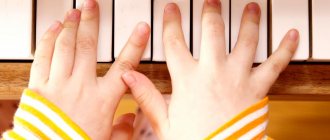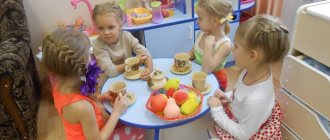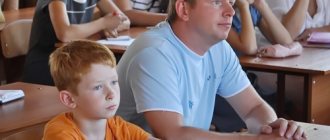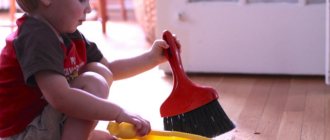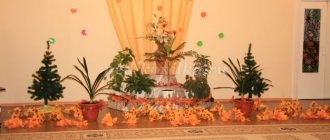Article 18 of the Law of the Russian Federation “On Education” states: “Parents are the first teachers. They are obliged to lay the first foundations for the physical, moral and intellectual development of the child’s personality at an early age.”
One of the principles of preschool education is cooperation between the preschool institution and the family.
The federal state standard for a teacher is the basis for assisting parents in raising children, protecting and developing their physical and mental health, developing individuality and providing the necessary assistance for developmental disorders.
The Federal State Educational Standard states that work carried out with parents should be individual, taking into account social status, “mood in the family,” parental requirements for education and the degree of parental interest in the activities of the preschool institution.
Family and kindergarten are the two pillars on which we build our future. Often they lack mutual understanding, compromise, to hear each other and interact in harmony. How can this situation be changed? How to involve parents in joint work? How to create a unified field for child development in the family and kindergarten?
There are the following directions for involving parents in joint activities with a preschool institution:
1. Cognitive; 2. Leisure; 3. Information and analytical; 4. Visual and informational.
There are traditional and non-traditional forms of holding parent meetings.
Traditional forms, such as: classic parent meetings, conversations, consultations, work with the parent committee, design of moving folders and stands, open days - teachers use every day in their activities. However, in modern conditions, these forms of interaction are not enough for full cooperation between a preschool institution and a family, so there are also non-traditional forms of interaction.
These include: 1. Interaction via Internet technologies (kindergarten websites, personal blogs of teachers, sending information via e-mail, etc.) 2. Conducting master classes for parents; 3. Publication of family newspapers; 4. Photo exhibitions; 5. Round tables 6. Pedagogical living room.
Our kindergarten actively uses such a non-traditional form of working with parents as a pedagogical lounge.
The pedagogical lounge is a specially organized form of interaction between preschool teachers, specialized preschool specialists (speech therapist, psychologist, nurse), parents and students.
Visiting teachers' lounges allows parents to interact with children in a new way, taking into account the consultations provided by teachers.
The main goal of holding pedagogical lounges is to develop the child’s individuality with the help of parents, with their active participation.
Preparation for organizing a teaching lounge begins with defining a topic, for example: • “Do you know your child?” • “Our friend is a book” • “Children play - we play together” • “Our friendly family” • “Protecting the life and health of a child”
“I’m graduating from a nursery, I’m entering a kindergarten” - this was the theme of one of the most interesting (in the opinion of parents) pedagogical meetings held in our kindergarten.
We created invitations for parents that announced this event in order to interest parents.
A speech therapist and a psychologist spoke with the consultation “After three it’s too late.” Parents could also receive individual advice on issues that interested them. Then the teachers spoke and summed up the results of the first year at the preschool educational institution. To be initiated into the ranks of the kindergarten, parents were solemnly presented with the “Code of a True Parent” and the “Oath of a Parent” was pronounced.
Parents' oath
Do you swear: • To love “Berezka” as much as we do? • Bring children to classes in any weather: frost, slush, heat? • Treat your children with respect, love your child not for good behavior, but because he is your one and only? • Actively participate in all our holidays and meetings? • Maintain an atmosphere of kindness and love?
Then the parents were solemnly awarded in various categories: • The most responsive • The most responsible • The most active • The most friendly • The most friendly • For the ability to make friends
The reward was memorial certificates created by the children with the help of the teacher. A mini-concert with the participation of children was organized for parents. And in conclusion, a video film about the life of the group over the past year was presented to the parents.
The advantage of this system of interaction between the preschool educational institution and the family is: • A positive emotional attitude of teachers and parents to work together to raise children; • Taking into account the child's individuality; • Strengthening family ties; • Possibility of implementing a unified program for the upbringing and development of children in preschool educational institutions and families.
Author: Gekk Victoria Evgenievna, teacher, MBDOU kindergarten No. 459 “Berezka”, Chelyabinsk, Russia
The article is published in the author's edition
Pedagogical lounge “Modern forms of working with parents”
MKOU "Progymnasium No. 9 "Rucheek"
Khasavyurt
Pedagogical living room
“Modern forms of working with parents”
Performed by: music director
Batymurzaeva N.V.
Target:
Dissemination of the experience of interaction between the music director of a preschool educational institution and the families of pupils.
Tasks:
- To increase the educational level of parents’ competence in matters of children’s musical development, to establish contact with family members, to coordinate educational interaction with the child;
- To familiarize parents with and test the system of methodological TRIZ games aimed at the musical development of children.
- Enrich the methodical piggy bank for parents “Music Workshop”.
Preparatory work:
- Making invitations for parents to the living room.
- Questioning of parents on the problem “Musical development of children” (Appendix No. 1).
- Creation of a presentation “TRIZ games and teaching aids used in preschool educational institutions.”
- Design of an exhibition of musical and didactic games aimed at the musical development of preschool children.
- Instructions for parents “Modern forms of working with children”
- (Appendix No. 2).
- Individual communication with parents on the topic: “Musical repertoire aimed at the development of children.”
Event plan:
1. Introductory speech by the music director on modern technologies.
2. Acquaintance with the results of the parent survey.
3. Screening of the presentation “TRIZ games and teaching aids used in preschool educational institutions”
4. Exchange of experiences of parents “Musical repertoire aimed at the development of children.”
5. Memo for parents “Modern forms of working with children”
Progress of the event:
1. Opening remarks by the music director on modern technologies.
To ensure favorable living conditions and upbringing of a child, the formation of the foundations of a full-fledged, harmonious personality, it is necessary to strengthen and develop the close connection between the kindergarten and the family.
When planning my work in my musical and artistic activities, I try to use both traditional and non-traditional forms of interaction with the family.
One of the main indicators of a child’s level of development can be considered the richness of his musical perception. And his overall mental development and future success in music school largely depend on these data. That is why TRIZ pedagogy focuses on this area. The child’s ability to communicate, explore the world, and plan his actions is formed as his speech develops.
2. The results of the parent’s survey are analyzed
“Musical development of children” (Appendix No. 1).
3. Screening of the presentation “TRIZ games and teaching aids used in preschool educational institutions”
In our kindergarten, the methods and techniques offered by TRIZ technology are very widely and actively used. (slides 1-2)
We want to introduce you and play with some of them.
- Circles of Lull.
The tool consists of several circles of different diameters strung on a common rod. An arrow is installed at the top of the rod. All circles are divided into the same number of sectors. The circles and arrow are movable. The free rotation of all parts leads to the fact that certain sectors on each of the circles appear under the arrow.
The purpose of this manual: to clarify the knowledge of preschoolers in various subject areas; develop the variability of imaginary images. “Show the composer”, “Musical professions”, “Name the note” and a mood icon.
- Manual "Caterpillar"
(slide 3)
Forms the ability to compare objects according to several different characteristics. Compose riddles using signs presented in the form of visual symbols. Learn to classify objects according to these characteristics and make groups of musical instruments.
4. Exchange of experiences of parents
“Musical repertoire aimed at the development of children.”
- Game "In a circle"
Children sit around the table. In my mother’s hands is a stack of upside down cards. The child takes any picture from this pile, for example, “tambourine,” and comes up with some kind of game, “Loud - Quiet.” The picture moves to mom, dad, brother, etc. Each player completes the picture with a definition and moves it around the circle. The player who named the last game keeps the picture and gets the right to take the next picture from the pile. The winner is the one with the most pictures.
- Game "Box of Songs"
You will need a box with 8-10 any toys.
Contents: Mom suggests taking figures out of the box at random. We need to think about what song to perform. After the first player has sung 2 - 3 songs, the next one takes out another object and continues to remember songs about this object. When the concert is over, the items are collected together and a new concert begins. It is important that each time you get a complete composition, and that the child comes up with different options for actions with the same object in different situations.
5. Summing up the event.
Preschool age is unique, because as a child develops, so will his life, which is why it is important not to miss this period to reveal the creative potential of each child. TRIZ technology adapted for preschool age will allow you to educate and train a child under the motto “Creativity in everything!”
Work with preschoolers using TRIZ is interesting and multifaceted, it is well implemented and combined with work according to the program, complements it with more effective results.
We hope that today's information will be useful in your endeavors, go for it, dear parents! Good luck to everyone and see you soon!
Appendix No. 1
Appendix No. 2.
Review of the teachers' lounge
“Modern work with parents”
Many parents set themselves the task of developing their child, primarily creatively. Great attention is paid to the development of such abilities.
Before this event, Nadiya Vagabovna conducted a survey with us “Musical development of the child.” There were already questions there that made me think. Then we were given invitations to the living room. After this, it was inconvenient to ignore the event.
We learned that music classes using modern technologies are improvisation, games, hoaxes.
After all, it is important that a modern child not only master a certain amount of knowledge and skills, but also be able to think actively, be able to find a way out of any situation, draw conclusions, prove, explain, and have a certain speech activity. Therefore, the music director in his work pays special attention to the musical development of his students.
Then we were shown a presentation “TRIZ - games and teaching aids used in preschool educational institutions.” It turns out that at home, I played games with my child using TRIZ elements, without even knowing it.
During this event, I saw that TRIZ helps to increase the level of communication, information, and cognitive needs of our children.
Parent of the senior group Mamatavova G.B.
Director of
the Progymnasium “Rucheyok” Malikova M.G.
Review of the teachers' lounge
“Modern work with parents”
Nadiya Vagabovna Batyrmurzaeva belongs to that category of creative teachers who are in constant search for new forms and ideas of aesthetic education of children.
Nadiya Vagabovna is a talented teacher and musician. In her classes, children do not just sing, listen and move. It broadens their horizons, teaches them to understand such concepts as “ri”, “genre”. Teaches you to live in harmony with yourself, your inner world and see only the most positive, bright and life-affirming. And all this, of course, through a fairy tale and a game.
Children enjoy going to music classes and eagerly participate in various holidays and matinees. This suggests that the professional level of the teacher is very high.
Nadiya Vagabovna often uses computer presentations in her work, which she creates herself. They make it possible to enrich the process of emotional-imaginative cognition, evoke a desire to listen to a piece of music repeatedly, and help to remember for a long time a piece of music proposed for listening. Presentations are indispensable when introducing children to the work of composers; in this case, bright portraits and photographs attract children’s attention, develop cognitive activity, and diversify children’s impressions.
Every day she uses ICT when performing musical and rhythmic exercises and various dances, helps children accurately follow the teacher’s instructions and perform movements expressively.
Parent of the senior group Kadimova L.D.
Director of
the Progymnasium “Rucheyok” Malikova M.G.
MAGAZINE Preschooler.RF
Presentation “Pedagogical living room for parents of future first-graders”Head of the circle: Biryukova Olga Aleksandrovna
Tasks:
- provide comprehensive assistance and support to parents in implementing activities during the transition of children from kindergarten to school;
- promote the establishment of trusting relationships between parents, kindergarten and school;
- provide methodological assistance in the development of cognitive interests (memory, attention, thinking, imagination)
in children of senior preschool age.
Regulations on the Pedagogical Lounge
1. General Provisions
1. 1. The club was created with the aim of establishing cooperation between kindergarten, family, and school in matters of continuity in the upbringing and education of children, comprehensive and systematic preparation of parents for teaching children at school, and improving the pedagogical literacy of parents.
1. 2. The main principles of the club’s work are:
- principle of openness,
- voluntariness,
- developing dialogue,
- privacy,
- activity,
- constant feedback,
- continuity.
1. 3. Club members are:
- children's parents,
- educational psychologist,
- kindergarten teachers,
- school teachers, speech therapist,
- preschool doctor,
- librarian.
1. 4. The immediate head of the club is O.A. Biryukova
- 5. The regulations on the club are approved by the head of the preschool institution
- The main activities of the living room
- 1. Providing psychological, medical and pedagogical assistance and support to parents in preparing their children for school.
- 2.Increasing the pedagogical knowledge of parents of children of senior preschool age.
- 3. Development of new forms of social-family interaction.
- 4. Popularization of the club’s activities among parents.
- Rights and obligations of club members
- 1. Parents - members of the club have the right:
- to receive qualified assistance in preparing and adapting a child to school;
- to receive practical assistance;
- to express your own opinion and share experiences;
- evaluate the activities of the club as a whole and on individual issues;
- participate in club planning.
- 2. Preschool educational institution has the right:
- to make adjustments to the club’s work plan depending on statements and problems, requests, and the relevance of the previous meeting.
- 3. The preschool educational institution is obliged to:
- plan the work of the club in accordance with the identified requests of parents and based on the psychological patterns of development of children of a given preschool age;
- provide a place for club meetings;
- provide qualified advisory and practical assistance to parents.
- 4. Parents - members of the club are obliged;
- respect the opinions of each other and other club members in the process of discussing issues of raising and educating children;
- observe the principle of confidentiality in the work of the club;
- take an active part in the work of the club.
- Organization of activities of the “Pedagogical Lounge”
- 1. The work of the club is carried out on the basis of a preschool educational institution.
- 2. The work is planned based on the results of surveys of parents and recommendations of an educational psychologist, kindergarten teachers, and school teachers.
- 3. The number of club meetings depends on the identified requests of parents and the psychological characteristics of children 6-7 years old.
- 4. Following the results of the club meetings, the results of the work and its effectiveness are discussed.
- Forms of club organization
- lectures,
- round table,
- workshops, trainings,
- conversation-dialogue,
- meetings.
Teacher teaching a lesson
Joint event from preschooler to schoolchildren
Parents talk about their professions
School visit
School number 2
Club results
As a result of the club’s work, parents develop certain models of behavior with their children, the level of pedagogical knowledge and skills increases, positive thinking is activated, helping parents avoid or overcome difficulties in preparing children for school, establishing trusting relationships between children, teachers and parents, which has a beneficial effect on emotional state of the child during the period of adaptation to school. According to the survey results, 35% of parents experience difficulties at the end of the school year. These are mainly those parents who did not attend the club.
| Next > |

